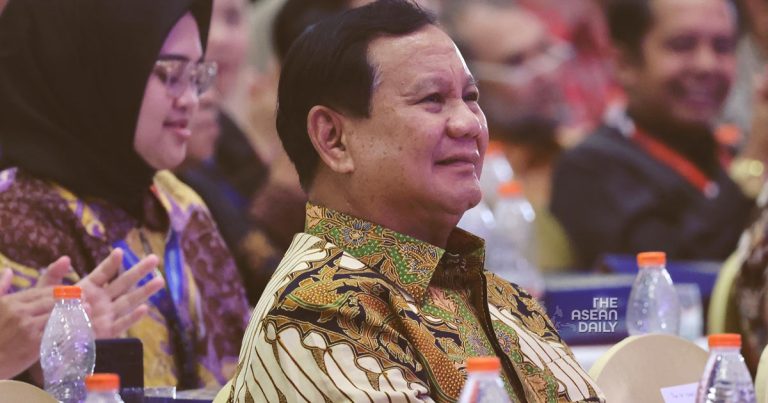16-4-2024 (JAKARTA) Speculation that Indonesia, the world’s largest Muslim-majority nation, might consider establishing diplomatic relations with Israel as a means to secure membership in the prestigious Organisation for Economic Cooperation and Development (OECD) has been met with outright rejection and warnings of “political suicide” from observers within the country.
The contentious claim, reported last week by Israeli news site Ynet, suggested a supposed agreement for Jakarta to formally recognise and normalise ties with Israel ahead of a vote on Indonesia’s accession to the 38-member OECD. However, such a move would be akin to “committing political suicide” for any Indonesian politician who dared to broach the subject, according to Dina Sulaiman, founder of the Indonesian Centre for Middle East Studies.
“The majority of the Indonesian public is still pro-Palestinian,” Sulaiman told This Week in Asia, underscoring the depth of sentiment surrounding the long-standing conflict.
To gain entry into the OECD, applicants must secure the approval of all current member states, including Israel. Successful candidates, as outlined in the organisation’s road map to membership, must “demonstrate … like-mindedness in their statements and actions in their relations with the organisation and its members”.
Ynet’s report, published on Thursday, cited a purported letter from OECD Secretary General Mathias Cormann to Israel’s Foreign Minister Israel Katz, stating that the organisation’s main decision-making body had “officially agreed to the clear and explicit early conditions according to which Indonesia must establish diplomatic relations with all OECD member countries before any decision is made to admit it to the OECD”.
The report further quoted a supposed letter from Katz to Cormann, expressing anticipation of a “positive change” in Indonesia’s “hostile policy” towards Israel, enabling the establishment of ties. It claimed that Indonesia’s accession to the OECD could take up to three years, with Israel holding veto power if Jakarta failed to normalise relations.
However, Indonesia swiftly dismissed these claims, with foreign ministry spokesman Lalu Muhammad Iqbal stating on Thursday: “There are no plans to open diplomatic relations with Israel, especially in the wake of Israel’s atrocities in Gaza.”
“Indonesia’s position has not changed, and we remain firmly in support of Palestine’s independence within the framework of a two-state solution. Indonesia will always be consistent and be at the forefront of defending the rights of the Palestinian people.”
Lalu acknowledged that it would take “quite a long time” for Indonesia to join the OECD but noted that Jakarta planned to adopt the organisation’s membership road map by next month.
At a meeting of OECD ambassadors in January, Israel reportedly raised objections to Indonesia joining the organisation given the absence of diplomatic ties between the two countries.
The Ynet report was not the first this year to claim that Indonesia was preparing to officially recognise Israel. In late February, US-based media outlet Jewish Insider reported that the two countries had been set to announce an agreement in October, just before Hamas launched its deadly attack that sparked the ongoing war in Gaza. However, Ari Dwipayana, a staff coordinator for outgoing Indonesian President Joko Widodo, dismissed the report as “completely incorrect”.
Earlier, Israeli broadsheet The Jerusalem Post reported that Indonesian Defence Minister Prabowo Subianto, now the Southeast Asian nation’s president-elect, had led an effort to cooperate on agriculture, leading Prabowo to issue a statement denying any such partnership.
Regardless of the veracity of these reports, Jakarta would likely find it impossible to normalise relations with Israel at the present moment given public sentiment amid the bloody Gaza war, in which more than 33,000 Palestinians have reportedly died.
“Especially in the last few months, public sentiment has been very pro-Palestinian, as people are concerned about what is happening in Gaza,” said Sulaiman of the Indonesian Centre for Middle East Studies. “I am sure that normalisation with Israel will not happen in the near future.”
A survey by Singapore’s ISEAS-Yusof Ishak Institute released earlier this month showed that 74.7 per cent of Indonesian respondents viewed the Israel-Gaza war as their top geopolitical concern, and nearly 80 per cent were concerned that the attack on Gaza had gone too far.
Israel was likely pursuing diplomatic normalisation with Indonesia to build upon the Abraham Accords, US-mediated agreements it reached with the United Arab Emirates, Bahrain, and other Arab countries beginning in 2020, said Siti Mutiah Setiawati, who lectures on Middle Eastern governance and politics at Gadjah Mada University in Yogyakarta.
Formal ties with Indonesia could pave the way for Israel to extend its diplomatic outreach to other Muslim-majority countries in Asia, including Malaysia, Pakistan, and Bangladesh, she added.
While Israel and Indonesia have had informal defence engagements for years, such as the Indonesian Air Force’s purchase of 30 Skyhawk combat aircraft from its Israeli counterpart between 1979-82 and the training of Indonesian pilots at an airbase in Israel over the same period, Siti cautioned that such informal ties are unlikely to lead to a full diplomatic relationship solely because Indonesia aspires to become an OECD member.
“There will be turmoil and waves of dissent within society if such ties were established,” Siti warned. “Indonesia’s most consistent foreign policy is the Palestinian issue. Since Indonesian independence leader Sukarno until Jokowi as Widodo is popularly known, no president has suggested opening diplomatic relations with Israel.”
As Jakarta dismisses the reports and reaffirms its unwavering support for Palestinian independence, the prospect of normalising ties with Israel remains a highly contentious and politically charged issue in the world’s largest Muslim-majority nation.




